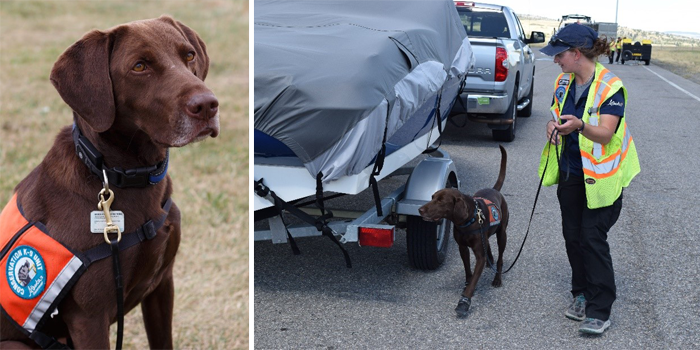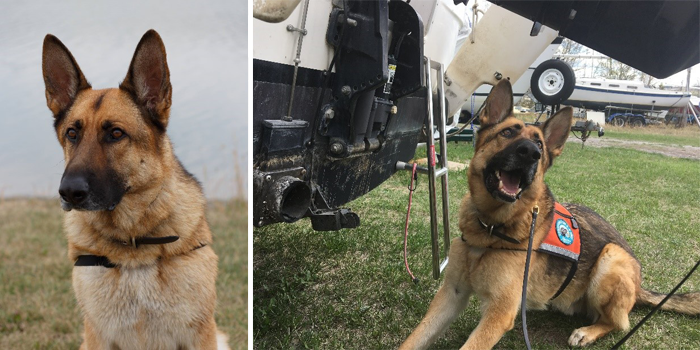Government mail service may be affected by the Canada Post labour disruption. Learn about how critical government mail will be handled.
Overview
Alberta’s Conservation K-9 Program is part of the Aquatic Invasive Species program. The program employs sniffer dogs at watercraft inspection stations to inspect watercrafts entering Alberta to ensure they are not transporting zebra and quagga mussels.
Remember, watercraft inspections are now mandatory in Alberta. All passing watercraft, including non-motorized, commercially-hauled and privately-hauled watercraft, must stop every time, regardless of where you are coming from or going to. It’s the law!
K-9 teams also conduct routine inspections of shorelines and water infrastructure, including docks and boat launches, at lakes across the province to ensure they are mussel-free.
Check out the videos below to see Alberta’s conservation K-9s at work sniffing watercrafts and shorelines for invasive mussels.
The K-9 teams also help to fight other invasive species that threaten Alberta. In 2017 and 2018 teams deployed in Fish Creek Provincial Park in Calgary to learn to detect the invasive plant Thesium arvense. As well, teams are currently collaborating with the Wild Boar Control Program to determine how the K-9 teams could assist with monitoring wild boar-at-large.
Check out the videos below to learn more about our K-9 team’s work to detect Thesium arvense and wild boar.
How the Conservation K-9 Program began
Program development
In 2014, as part of a Crown Managers Partnership initiative,the Alberta Government partnered with the Flathead Basin Commission in Montana and the Alberta Irrigation Projects Association to pilot the use of mussel-detecting dogs at watercraft inspection stations.
The pilot study investigated the possibility of incorporating detection dogs into ongoing efforts to identify watercraft carrying zebra mussels (Dreissena polymorpha) and quagga mussels (Dreissena rostriformis bugensis) at watercraft inspection stations in Alberta and Montana.
The objectives of the pilot study were to:
- train dogs to detect adult zebra and quagga mussels by scent on a watercraft
- demonstrate the teams readiness to deploy
- deploy trained dogs to watercraft inspection stations in Alberta and Montana to continue assessments in real deployment scenarios
- synthesize training and deployment outcomes in consideration of large-scale deployment
During the pilot study, the non-profit organization Working Dogs for Conservation was contracted to train their dogs to detect mussels on watercrafts. The teams spent 13 days on either side of the border working at inspection stations. At the end of the pilot study, a controlled trial was conducted to compare the performance of dogs and trained human inspectors. While humans working alone missed up to 25% of watercraft harbouring mussels, dogs correctly identified 100% of the mussel-fouled watercraft.
Check out the video below to learn more about the sniffer dog pilot study.
Canine deployment in Alberta
In 2015, following the success of the pilot study, the Alberta Government contracted Working Dogs for Conservation to help create the Conservation K-9 program, thereby incorporating the dogs as a permanent part of the watercraft inspections element in the Aquatic Invasive Species program.
Alberta’s three K-9 teams were trained by Working Dogs for Conservation and Lt. Lynette Shimek of the California Department of Fish and Wildlife. Initial training involved 140 hours of a specialized handler and canine boot camp where the handlers were matched with their canines. The canines learned to detect the odour, pinpoint the exact location, and display an alert. The handlers were trained to watch the dogs for changes in behaviour and how to methodically guide the dogs around the boat. At the end of the training, all three team’s successfully passed external certification to the standards used by the California Department of Fish and Wildlife for the detection of Dreissenid mussels.
The teams are now deployed provincewide and focus their attention on dog supported watercraft inspections at the highest risk border stations in the province.
Meet the dogs
Our dogs come from different backgrounds, but share the desire of a special toy as their paycheck. They are fully integrated into the lives of their handlers – by working, living and playing together, the dogs and handlers form a strong bond that makes them a better team in the fight against invasive species. Keep an eye out for the dogs hard at work at watercraft inspection stations and lakes across the province during the summer months.
Hilo
Hilo began his career training to be a guide dog in California, but decided he would rather move to Alberta to sniff out invasive species instead. While on shift, Hilo is very methodical and careful, which is quite at odds with his joyful and fun-loving personality when he’s off the clock! Hilo is also a great ambassador for the K-9 and AIS programs, happily showing off his sniffing skills for anyone who wants to watch.

Diesel
Diesel hails from a Labrador rescue in sunny California, but has thoroughly embraced living in Alberta (though he does wear a jacket in the winter!). A natural athlete, Diesel completes his boat searches for invasive mussels with the speed and agility of an acrobat. His reward is a squeaky ball, which he will happily squeak continuously for his handler and anyone else who is watching!

Seuss
Not happy being left at home, Seuss is a focused and devoted partner at work. He loves the challenge of sniffing out tiny invasive mussels on boats and shores. A serious guy when it comes to his job, he has a goofy side that comes out when he is trying to convince someone to play with him.

Watch the video below to meet and see the Conservation K-9 Unit Dogs in action as they sniff watercraft for invasive quagga and zebra mussels.
- When the nose, knows – the dog squad sniffing out invasive species (November 13, 2019)
- Alberta’s top dogs are on the trail of an invasive weed (September 22, 2016)
- Alberta's Conservation K-9 team and partners commended for efforts in keeping waters free of foreign mussels (April 6, 2016)
- Province gears up to protect Alberta waters from invasive species (March 18, 2016)
- Man's best friend is a mussel’s worst enemy (August 7, 2015)
- Sniffer dogs lend a nose to mandatory boat inspections (March 20, 2015)
- Four-legged friends join in Alberta’s fight against invasive mussels (August 6, 2014)